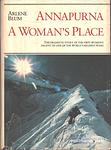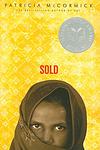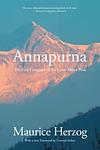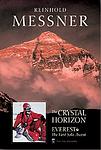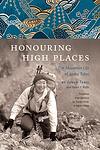The Greatest "Nepal" Books of All Time
Click to learn how this list is calculated.
This list represents a comprehensive and trusted collection of the greatest books. Developed through a specialized algorithm, it brings together 288 'best of' book lists to form a definitive guide to the world's most acclaimed books. For those interested in how these books are chosen, additional details can be found on the rankings page.
Genres
Countries
Date Range
Reading Statistics
Click the button below to see how many of these books you've read!
Download
If you're interested in downloading this list as a CSV file for use in a spreadsheet application, you can easily do so by clicking the button below. Please note that to ensure a manageable file size and faster download, the CSV will include details for only the first 500 books.
Download-
1. The Snow Leopard by Peter Matthiessen
"The Snow Leopard" is a travelogue that recounts the author's two-month journey in the Himalayas with naturalist George Schaller. The duo trek through the rugged and remote mountains of Nepal on a quest to study the rare blue sheep and possibly spot the elusive snow leopard. The book is as much a spiritual journey as it is a physical one, with the author seeking solace and understanding following the death of his wife. The narrative explores themes of grief, nature, and Buddhism, offering a poignant and introspective look at life and loss.
-
2. Into Thin Air by Jon Krakauer
This gripping non-fiction book recounts the tragic events of the 1996 Mount Everest disaster. The author, a journalist and experienced climber, was part of a commercial expedition to summit Everest. The expedition soon turned disastrous due to a severe storm, leading to the death of several climbers from various teams. The book provides a vivid, personal account of the harrowing ordeal, detailing the physical and psychological challenges faced by climbers at high altitudes, as well as the ethical and commercial aspects of mountaineering expeditions.
-
3. Annapurna: A Woman's Place by Arlene Blum
This book chronicles the journey of the first American women's team to scale Annapurna, one of the most dangerous and formidable peaks in the Himalayas. Facing not only the physical challenges of the climb but also societal pressures and skepticism, the team confronts internal conflicts, harsh weather, and life-threatening situations. The narrative highlights the struggle and triumph of women in a male-dominated field, providing an inspiring testament to teamwork, perseverance, and determination.
-
4. Sold by Patricia McCormick
The novel follows a young Nepalese girl who lives in a poor, rural village. When her stepfather sells her into slavery in a brothel in India, she must navigate the horrors of her new life. The narrative explores her struggle for survival, her attempts to escape, and the friendships she forms with other girls in the brothel. Ultimately, the novel is a harrowing exploration of human trafficking and sexual exploitation.
-
5. The Buddha And His Religion by J. Barthelemy Saint-Hilaire
"The Buddha and His Religion" offers a comprehensive exploration of the life and teachings of Siddhartha Gautama, known as the Buddha, and the subsequent development of Buddhism. The book delves into the historical and cultural contexts of ancient India that shaped and were shaped by Buddhist philosophy. It examines the core principles of Buddhism, including the Four Noble Truths and the Eightfold Path, and discusses the spread and adaptation of Buddhism in various regions. Additionally, the text analyzes the organizational structure of the Buddhist community, the role of monks and laity, and the evolution of Buddhist thought and practice over time.
-
6. Annapurna by Maurice Herzog
This book recounts the incredible true story of a French expedition to the Himalayas in the early 1950s. The team, led by an experienced mountaineer, faces extreme weather conditions, challenging terrains, and life-threatening situations in their quest to conquer the Annapurna peak. Despite losing fingers and toes to frostbite, the leader becomes the first person to reach the summit of an 8,000-meter peak, marking a significant milestone in mountaineering history. The narrative is not just about the physical journey but also delves into the psychological and emotional struggles of the climbers.
-
7. Everest: The West Ridge by Thomas Hornbein
This book is a firsthand account of a daring and historic climb of Mount Everest via the treacherous West Ridge - a route that had never been successfully ascended before. The narrative vividly describes the extreme physical and mental challenges faced by the climbers, the breathtaking beauty of the Himalayas, and the camaraderie and teamwork that was essential for survival. The author's detailed and compelling recounting of the expedition offers an intimate look at the perils, triumphs, and the sheer magnitude of human endurance in one of the harshest environments on Earth.
-
8. The Crystal Horizon by Reinhold Messner
"The Crystal Horizon" is a gripping account of the author's solo climb of Mount Everest without the aid of supplemental oxygen, a feat never accomplished before. The book not only details the physical and mental challenges faced during the climb but also delves into the philosophical and spiritual journey the author undergoes. The narrative is interspersed with reflections on the history and culture of the Himalayas, the nature of mountaineering, and the author's personal beliefs and motivations.
-
9. Honouring High Places by Junko Tabei
"Honouring High Places" is a compelling collection of autobiographical stories chronicling the remarkable life of the first woman to reach the summit of Mount Everest. The book offers a deeply personal account of the challenges she faced, from societal expectations in Japan and the physical demands of climbing to the joys and tragedies encountered on her expeditions. Through her vivid storytelling, the author paints a picture of her groundbreaking climbs, her dedication to environmental issues, and her commitment to encouraging women to embrace adventure and challenge gender norms in the world of mountaineering.
-
10. Nine Pints by Rose George
This book offers an in-depth exploration of blood, a substance that is both a vital component of our physiology and a symbol of life, death, and disease throughout human history. The narrative takes readers on a global journey, delving into the science, culture, and commerce of blood, from the history of bloodletting to the contemporary controversies surrounding blood donation and the blood trade. Through engaging storytelling, the author reveals the complexities of blood as a biological entity and its broader significance in society, touching on topics such as menstruation, bloodborne diseases, and the life-saving role of blood transfusions, while also examining the ethical implications of blood banking and the global inequalities in blood supply and access.
Reading Statistics
Click the button below to see how many of these books you've read!
Download
If you're interested in downloading this list as a CSV file for use in a spreadsheet application, you can easily do so by clicking the button below. Please note that to ensure a manageable file size and faster download, the CSV will include details for only the first 500 books.
Download

